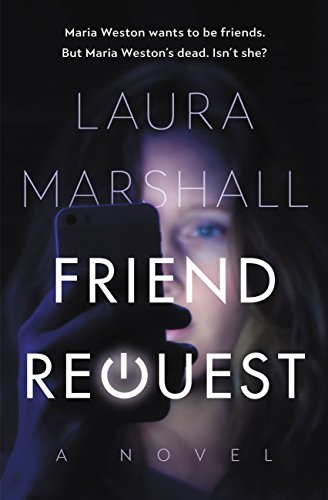Greetings, commies!
Somehow I missed the suicide prevention month, but it's never too late to write a post that touches upon mental health, peer pressure, bullying, social media, and how all those components can create a perfect disaster on all fronts. Hey, maybe some of you have school age kids. Maybe you are still reeling from the trauma of bullying. Consider reading Laura Marshall's thriller Friend Request.
Synopsis:
1989. When Louise first notices the new girl who has mysteriously transferred late into their senior year, Maria seems to be everything the girls Louise hangs out with aren't. Authentic. Funny. Brash. Within just a few days, Maria and Louise are on their way to becoming fast friends.
2016. Louise receives a heart-stopping email: Maria Weston wants to be friends on Facebook. Long-buried memories quickly rise to the surface: those first days of their budding friendship; cruel decisions made and dark secrets kept; the night that would change all their lives forever.
Louise has always known that if the truth ever came out, she could stand to lose everything. Her job. Her son. Her freedom. Maria's sudden reappearance threatens it all, and forces Louise to reconnect with everyone she'd severed ties with to escape the past. But as she tries to piece together exactly what happened that night, Louise discovers there's more to the story than she ever knew. To keep her secret, Louise must first uncover the whole truth, before what's known to Maria--or whoever's pretending to be her--is known to all.
2016. Louise receives a heart-stopping email: Maria Weston wants to be friends on Facebook. Long-buried memories quickly rise to the surface: those first days of their budding friendship; cruel decisions made and dark secrets kept; the night that would change all their lives forever.
Louise has always known that if the truth ever came out, she could stand to lose everything. Her job. Her son. Her freedom. Maria's sudden reappearance threatens it all, and forces Louise to reconnect with everyone she'd severed ties with to escape the past. But as she tries to piece together exactly what happened that night, Louise discovers there's more to the story than she ever knew. To keep her secret, Louise must first uncover the whole truth, before what's known to Maria--or whoever's pretending to be her--is known to all.
My thoughts:
I feel grateful for this novel and strangely validated by it. Having endured my share of school bullying, I always resented being told to "grow up, you're not in high school anymore". It's almost like an additional slap, essentially being called a whiny baby. My guess is that those dismissive phrases come from those who never were bullied themselves or maybe even instigated the bullying. Anyone who was on the receiving end of bullying will attest that adolescent trauma can linger. It affects your confidence well into adulthood, no matter how successful you may end up becoming. There is always that insecurity, that sense of unworthiness that makes you work extra hard to earn validation. So I applaud the author for acknowledging that. I also applaud her for creative a complex female protagonist who is not immediately sympathetic. Louise is not someone you immediately warm up to and want to root for, despite all the sob stories that she tells. Louise spends a lot of time bemoaning her plight as a newly divorced mom in her early 40s with minimal dating prospects. It took her many years to conceive her only son, only to have her narcissistic husband Sam dump her for a younger woman. So Louise is still in that neurotic, insecure, school-girl place where she constantly compares herself to other women in her age bracket, reads other people's profiles on Facebook. However, what makes the reader pause before embracing Louise is her dirty high school secret: having given into peer pressure, she had joined a bullying campaign against a classmate named Maria Weston. Louise blames herself for Maria's death on the night of the prom, but her desperate ways of seeking justification for her behavior make her remorse seem insincere. "I know I acted terribly, but ..." She spends a lot of time defending herself, and that makes the reader so hesitant to embrace her. I am not sure if this was the author's intention, but if she did intend to create this kind of ambivalence in the reader, she succeeded admirably. It's true that in bullying there are those who device the cruel master plots and those who carry them out. The queen of the clique devises the scheme and lets her "betas" do the dirty work. Louise ended up in that "beta" role. The whole novel is the story of a "beta" who had to stifle her conscience to gain popularity points. Very, very socially and psychologically authentic.

No comments:
Post a Comment